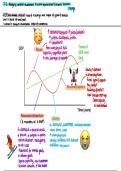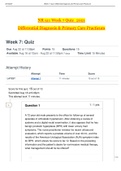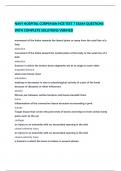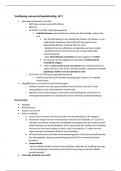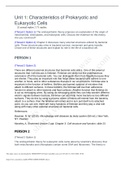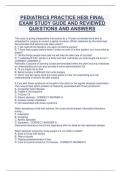Gizmos Student Exploration: Cell Division Mitosis
2024 Questions and Answers 100% Correct
Name: Date:
Student Exploration: Cell Division
Directions: Follow the instructions to go through the simulation. Respond to the questions and
prompts in the orange boxes.
Vocabulary: cell division, centriole, centromere, chromatid, chromatin, chromosome, cytokinesis, DNA,
interphase, mitosis
Prior Knowledge Questions (Do these BEFORE using the Gizmo.)
1. Cells reproduce by splitting in half, a process called cell division. What do cells need to do between
divisions to make sure that they don’t just get smaller and smaller?
A cell must grow in size.
2. The genetic information of a cell is carried in its DNA (short for deoxyribonucleic acid). What do cells need
to do between divisions to make sure that a full set of DNA gets passed on to each daughter cell?
DNa must be copied so DNA is complete to the daughter cells
Gizmo Warm-up
On the SIMULATION pane of the Cell Division Gizmo, check that the Cycle
Length is set to 12 hours. Click Play ( ), observe until the maximum number of
cells is shown, and then click Pause ( ).
1. Look at the cells. Do they all look the same? Yes
2. Cells that are in the process of dividing are said to be in mitosis or
cytokinesis. Cells that are not dividing are in interphase.
Check the Magnify box and move the cursor over the cells.
A. Of the 100 cells shown, how many are in the process of dividing?
11
B. Select the BAR CHART tab, and turn on Show numerical values. How many cells are in the
interphase stage of their life cycle? like 82
C. Based on these two observations, would you say that a cell spends most of its life cycle in
interphase or in mitosis/cytokinesis? interphase
Reproduction for educational use only. Public sharing or posting prohibited. © 2020 ExploreLearni ng ™ All rights reserved
about:blank 1/6
, Get the Gizmo ready:
Activity A:
● Click Reset ( ).
Phases of the cell ● Select the DESCRIPTION tab.
cycle ● Click on the right arrow once so that Interphase is
shown.
Question: What are the stages of the cell cycle?
1. Observe: Click Play and hold the cursor over the cell. Observe the cell as it divides several times. (This
happens quickly!) What do you notice happening during this process?
the chromosomes appear then line up then two circle thingies appear and separate
2. Summarize: On the DESCRIPTION pane, read about each phase in the cell cycle. In the spaces below,
sketch the cell in each phase and summarize what occurs in your own words. (If you are doing this online,
you can take a screenshot & paste it into the sketch column).
Phase Sketch Summary
Interphase cell is growing and chromosomes are hard to see
nuclear membrane is gone, chromosomes appear, spindles
Prophase appear
Metaphase spindles line up at the equator
chromosomes split apart and move towards the ends of the
Anaphase cell
Telophase nucleus starts forming again, this time one for each
Reproduction for educational use only. Public sharing or posting prohibited. © 2020 ExploreLearni ng ™ All rights reserved
about:blank 2/6
2024 Questions and Answers 100% Correct
Name: Date:
Student Exploration: Cell Division
Directions: Follow the instructions to go through the simulation. Respond to the questions and
prompts in the orange boxes.
Vocabulary: cell division, centriole, centromere, chromatid, chromatin, chromosome, cytokinesis, DNA,
interphase, mitosis
Prior Knowledge Questions (Do these BEFORE using the Gizmo.)
1. Cells reproduce by splitting in half, a process called cell division. What do cells need to do between
divisions to make sure that they don’t just get smaller and smaller?
A cell must grow in size.
2. The genetic information of a cell is carried in its DNA (short for deoxyribonucleic acid). What do cells need
to do between divisions to make sure that a full set of DNA gets passed on to each daughter cell?
DNa must be copied so DNA is complete to the daughter cells
Gizmo Warm-up
On the SIMULATION pane of the Cell Division Gizmo, check that the Cycle
Length is set to 12 hours. Click Play ( ), observe until the maximum number of
cells is shown, and then click Pause ( ).
1. Look at the cells. Do they all look the same? Yes
2. Cells that are in the process of dividing are said to be in mitosis or
cytokinesis. Cells that are not dividing are in interphase.
Check the Magnify box and move the cursor over the cells.
A. Of the 100 cells shown, how many are in the process of dividing?
11
B. Select the BAR CHART tab, and turn on Show numerical values. How many cells are in the
interphase stage of their life cycle? like 82
C. Based on these two observations, would you say that a cell spends most of its life cycle in
interphase or in mitosis/cytokinesis? interphase
Reproduction for educational use only. Public sharing or posting prohibited. © 2020 ExploreLearni ng ™ All rights reserved
about:blank 1/6
, Get the Gizmo ready:
Activity A:
● Click Reset ( ).
Phases of the cell ● Select the DESCRIPTION tab.
cycle ● Click on the right arrow once so that Interphase is
shown.
Question: What are the stages of the cell cycle?
1. Observe: Click Play and hold the cursor over the cell. Observe the cell as it divides several times. (This
happens quickly!) What do you notice happening during this process?
the chromosomes appear then line up then two circle thingies appear and separate
2. Summarize: On the DESCRIPTION pane, read about each phase in the cell cycle. In the spaces below,
sketch the cell in each phase and summarize what occurs in your own words. (If you are doing this online,
you can take a screenshot & paste it into the sketch column).
Phase Sketch Summary
Interphase cell is growing and chromosomes are hard to see
nuclear membrane is gone, chromosomes appear, spindles
Prophase appear
Metaphase spindles line up at the equator
chromosomes split apart and move towards the ends of the
Anaphase cell
Telophase nucleus starts forming again, this time one for each
Reproduction for educational use only. Public sharing or posting prohibited. © 2020 ExploreLearni ng ™ All rights reserved
about:blank 2/6



